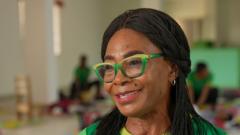Nonye Nweke established a Cerebral Palsy Centre in Nigeria after facing stigma and a lack of support for her daughter, Zimuzo, who requires lifelong care due to cerebral palsy. The article highlights the broader challenges of addressing neonatal jaundice and neurological disorders in a country with limited medical resources.
A Mother’s Determination: Battling Cerebral Palsy in Nigeria

A Mother’s Determination: Battling Cerebral Palsy in Nigeria
Nonye Nweke's journey to support children with cerebral palsy reveals a larger issue of healthcare access and societal stigma in Nigeria.
In Lagos, Nigeria, a mother’s love and resilience have given life to a beacon of hope for children with cerebral palsy. Nonye Nweke, a single mother, devoted her life to establishing the Cerebral Palsy Centre, a sanctuary for youngsters struggling with severe medical conditions. Among these children is Babatunde Fashola, affectionately called Baba, who at 22 years old stands less than 70cm (2ft 4in) tall and requires constant support due to his lifelong condition.
“When I first found Baba, he was abandoned as a baby,” Ms. Nweke recounts during a visit to the center, where she lovingly cares for twelve children, some as young as five, who are immobile and non-verbal. The centre itself runs solely on donations, though there exists a waiting list of over 100 families in need of assistance. “It’s an immense struggle—caring for someone costs about $1,000 a month, which is astronomical here,” Ms. Nweke explains, emphasizing the dire economic situation where Nigeria’s national minimum wage is approximately $540 per year.
Cerebral palsy is alarmingly prevalent in Nigeria, often triggered by untreated neonatal jaundice—a common condition affecting over 60% of newborns. Professor Chinyere Ezeaka from the Lagos University Teaching Hospital articulates that lack of immediate medical care for jaundice can lead to irreversible brain damage. Tragically, Nigeria features among the five countries most afflicted by neurological disorders resulting from this lack of treatment.
Since its inception, the Cerebral Palsy Centre has become a vital support system for families grappling with the societal stigma attached to disabilities, especially in rural areas where children with such conditions may be labeled as ‘witches’ or subjected to mistreatment. Ms. Nweke became intimately aware of this stigma during her own experiences trying to find support for her daughter, Zimuzo, adopting her amidst the misunderstanding and challenges of cerebral palsy.
Zimuzo has defied medical expectations, and currently at the age of 17, she reflects her mother’s spirit of resilience. The centre, however, faces the challenge of limited resources. Additionally, awareness campaigns and community-based projects like The Oscar Project—aimed at improving neonatal jaundice screening and treatment—are crucial, yet the path to systemic change remains long and difficult.
Toyin Saraki oversees the Oscar Project, which aims to empower health facilities with equipment to tackle jaundice effectively. “The ultimate goal is to prevent this condition from crippling the lives of innocent children,” she states, as they aspire to reach 10,000 mothers in their first year alone.
Despite these ambitious goals, Ms. Nweke remains a symbol of hope against the backdrop of a healthcare system strained by economic struggles and societal belief systems that exacerbate the experience of families like hers. “It’s overwhelming at times, but we keep going; my daughter is my life,” she declares, embodying the fighting spirit within Nigeria’s battles against cerebral palsy and beyond.
“When I first found Baba, he was abandoned as a baby,” Ms. Nweke recounts during a visit to the center, where she lovingly cares for twelve children, some as young as five, who are immobile and non-verbal. The centre itself runs solely on donations, though there exists a waiting list of over 100 families in need of assistance. “It’s an immense struggle—caring for someone costs about $1,000 a month, which is astronomical here,” Ms. Nweke explains, emphasizing the dire economic situation where Nigeria’s national minimum wage is approximately $540 per year.
Cerebral palsy is alarmingly prevalent in Nigeria, often triggered by untreated neonatal jaundice—a common condition affecting over 60% of newborns. Professor Chinyere Ezeaka from the Lagos University Teaching Hospital articulates that lack of immediate medical care for jaundice can lead to irreversible brain damage. Tragically, Nigeria features among the five countries most afflicted by neurological disorders resulting from this lack of treatment.
Since its inception, the Cerebral Palsy Centre has become a vital support system for families grappling with the societal stigma attached to disabilities, especially in rural areas where children with such conditions may be labeled as ‘witches’ or subjected to mistreatment. Ms. Nweke became intimately aware of this stigma during her own experiences trying to find support for her daughter, Zimuzo, adopting her amidst the misunderstanding and challenges of cerebral palsy.
Zimuzo has defied medical expectations, and currently at the age of 17, she reflects her mother’s spirit of resilience. The centre, however, faces the challenge of limited resources. Additionally, awareness campaigns and community-based projects like The Oscar Project—aimed at improving neonatal jaundice screening and treatment—are crucial, yet the path to systemic change remains long and difficult.
Toyin Saraki oversees the Oscar Project, which aims to empower health facilities with equipment to tackle jaundice effectively. “The ultimate goal is to prevent this condition from crippling the lives of innocent children,” she states, as they aspire to reach 10,000 mothers in their first year alone.
Despite these ambitious goals, Ms. Nweke remains a symbol of hope against the backdrop of a healthcare system strained by economic struggles and societal belief systems that exacerbate the experience of families like hers. “It’s overwhelming at times, but we keep going; my daughter is my life,” she declares, embodying the fighting spirit within Nigeria’s battles against cerebral palsy and beyond.


















